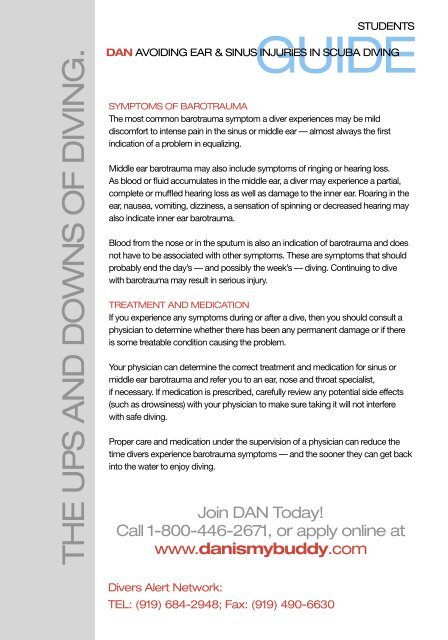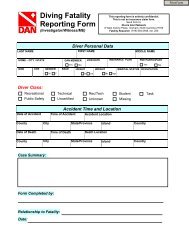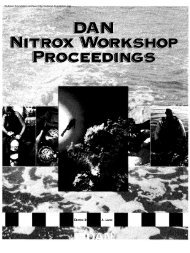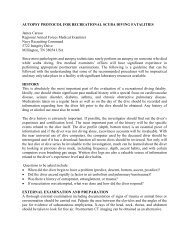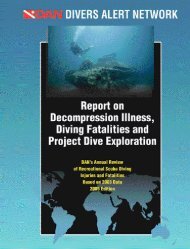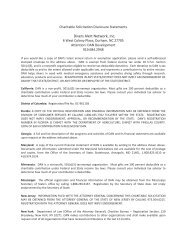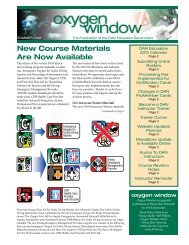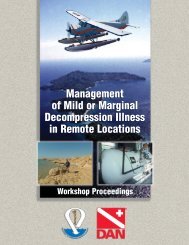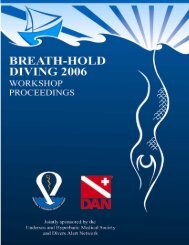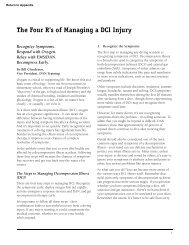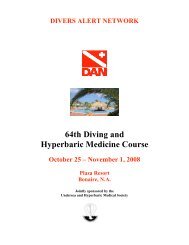dan avoiding ear & sinus injuries in scuba - Divers Alert Network
dan avoiding ear & sinus injuries in scuba - Divers Alert Network
dan avoiding ear & sinus injuries in scuba - Divers Alert Network
Create successful ePaper yourself
Turn your PDF publications into a flip-book with our unique Google optimized e-Paper software.
THE UPS AND DOWNS OF DIVING.<br />
STUDENTS<br />
GUIDE<br />
DAN AVOIDING EAR & SINUS INJURIES IN SCUBA DIVING<br />
SYMPTOMS OF BAROTRAUMA<br />
The most common barotrauma symptom a diver experiences may be mild<br />
discomfort to <strong>in</strong>tense pa<strong>in</strong> <strong>in</strong> the <strong>s<strong>in</strong>us</strong> or middle <strong>ear</strong> — almost always the first<br />
<strong>in</strong>dication of a problem <strong>in</strong> equaliz<strong>in</strong>g.<br />
Middle <strong>ear</strong> barotrauma may also <strong>in</strong>clude symptoms of r<strong>in</strong>g<strong>in</strong>g or h<strong>ear</strong><strong>in</strong>g loss.<br />
As blood or fluid accumulates <strong>in</strong> the middle <strong>ear</strong>, a diver may experience a partial,<br />
complete or muffled h<strong>ear</strong><strong>in</strong>g loss as well as damage to the <strong>in</strong>ner <strong>ear</strong>. Roar<strong>in</strong>g <strong>in</strong> the<br />
<strong>ear</strong>, nausea, vomit<strong>in</strong>g, dizz<strong>in</strong>ess, a sensation of sp<strong>in</strong>n<strong>in</strong>g or decreased h<strong>ear</strong><strong>in</strong>g may<br />
also <strong>in</strong>dicate <strong>in</strong>ner <strong>ear</strong> barotrauma.<br />
Blood from the nose or <strong>in</strong> the sputum is also an <strong>in</strong>dication of barotrauma and does<br />
not have to be associated with other symptoms. These are symptoms that should<br />
probably end the day’s — and possibly the week’s — div<strong>in</strong>g. Cont<strong>in</strong>u<strong>in</strong>g to dive<br />
with barotrauma may result <strong>in</strong> serious <strong>in</strong>jury.<br />
TREATMENT AND MEDICATION<br />
If you experience any symptoms dur<strong>in</strong>g or after a dive, then you should consult a<br />
physician to determ<strong>in</strong>e whether there has been any permanent damage or if there<br />
is some treatable condition caus<strong>in</strong>g the problem.<br />
Your physician can determ<strong>in</strong>e the correct treatment and medication for <strong>s<strong>in</strong>us</strong> or<br />
middle <strong>ear</strong> barotrauma and refer you to an <strong>ear</strong>, nose and throat specialist,<br />
if necessary. If medication is prescribed, carefully review any potential side effects<br />
(such as drows<strong>in</strong>ess) with your physician to make sure tak<strong>in</strong>g it will not <strong>in</strong>terfere<br />
with safe div<strong>in</strong>g.<br />
Proper care and medication under the supervision of a physician can reduce the<br />
time divers experience barotrauma symptoms — and the sooner they can get back<br />
<strong>in</strong>to the water to enjoy div<strong>in</strong>g.<br />
Jo<strong>in</strong> DAN Today!<br />
Call 1-800-446-2671, or apply onl<strong>in</strong>e at<br />
www.<strong>dan</strong>ismybuddy.com<br />
<strong>Divers</strong> <strong>Alert</strong> <strong>Network</strong>:<br />
TEL: (919) 684-2948; Fax: (919) 490-6630


